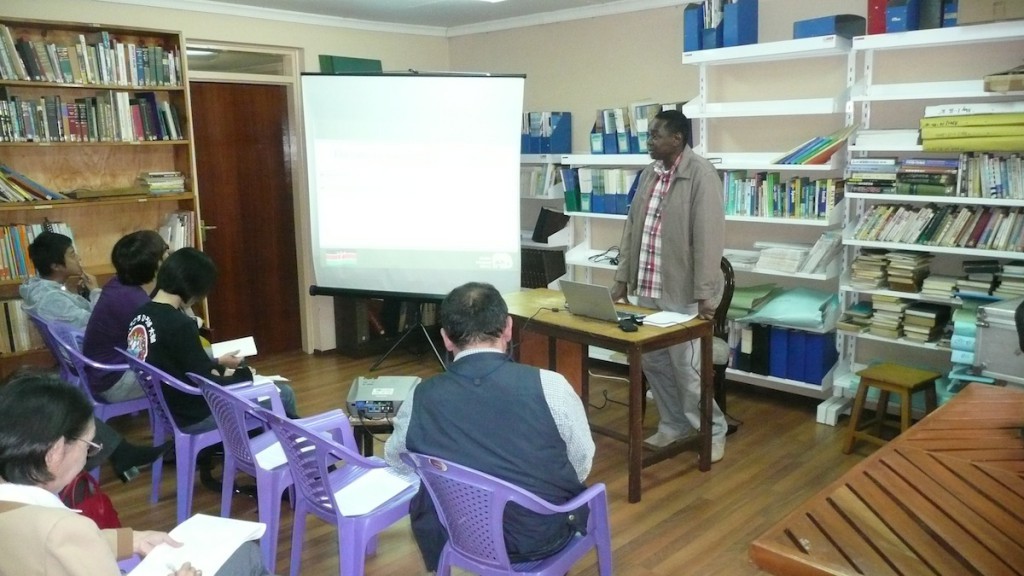更新日:2012/11/20
Wildlife Conservation, Tourism, and Local Host Population in Kenya
日時: 2012年8月3日
場所: JSPSナイロビ研究連絡センター書庫 兼セミナー室
共催: 京都大学グローバル生存学大学院連携プログラム、京都大学大学院アジア・アフリカ地域研究研究科、京都大学アフリカ地域研究資料センター
趣意:(英語でのレクチャーです)
Ecosystem in Kenya has a remarkable diversity. It is very important for conservation of the world bio-diversity and mass media of the world frequently deals with its richness. Foreign visitors started to enjoy “hunting safari” since the beginning of 20th century, and today, many tourists visit Kenya looking for “the paradise of wildlife”, “real Africa”, and “the rich repository of wilderness.” Tourism is a valuable economic resource for Kenya and nature conservation should be promoted. However, environmental preservation faces a crisis because of the population growth and the expansion of economic activities.
Activities of nature conservation exert profound influences on local human population in Kenya. Farms and/or grazing land were enclosed by the establishment of national parks and game reserves. Crops are raided, livestock are attacked by wild animals, and human life is also lost. Wildlife causes serious damage for local communities.
Then, it is urgent to address and examine following issues: the global issue of bio-diversity preservation and nature conservation, Kenyan national issues of tourism industry and management of conservation areas, and the local issues of protection of peoples’ life and coexistence between humans and wildlife.
In this seminar, we invite two Kenyan lecturers. Dr. Charles Musyoki works as a senior scientist at Kenya Wildlife Service. He has a rich knowledge about the history and current problems of nature conservation in Kenya. Dr. Tom Ondicho is a senior lecturer at the University of Nairobi. He conducted intensive researches on tourism, wildlife conservation, and their impacts on local populations.
Programme
Lecture 1: 14:00 – 15:00
“Conserving Wildlife in Kenya: Challenges and Opportunities”
Dr. Charles Musyoki (Kenya Wildlife Service)
Break: 15:00 – 15:10
Lecture 2: 15:10 – 16:10
“Tourism, Power and Politics: The Challenges of Community Participation in Wildlife Conservation and Ecotourism Development in Kimana, Kenya”
Dr. Tom Ondicho (University of Nairobi)
Break: 16:10 – 16:20
General Discussion: 16:20 – 17:00

【写真】 講義するCharles Musyoki博士
Abstracts
Lecture 1: “Conserving Wildlife in Kenya: Challenges and Opportunities”
Kenya is richly endowed with diverse wildlife species that are a source national pride and driver of the national economy through earnings from tourism. The country is home to the Big Five thus attracting large numbers of foreign tourists. The world famous Maasai Mara is a major attraction especially because of the spectacular annual wildebeest migration. The conservation and management of the wildlife however faces numerous challenges. Loss of habitat occasioned by a growing human population is the primary challenge whereas fragmentation of habitats and conflict between the needs of people and of wildlife feature conspicuously. Proactive interventions are necessary to manage and conserve wildlife for posterity.
Keywords
Wildlife, Challenge, Habitat, People, Conservation
Lecture 2: “Tourism, Power and Politics: The Challenges of Community Participation in Wildlife Conservation and Ecotourism Development in Kimana, Kenya”
This article presents a case study of a tourism project in which the people of Kimana have sought to exploit the commercial advantage of their communal land which lies adjacent to Amboseli National Park (ANP) in southern Kenya. The Kimana Community Wildlife Sanctuary represents one of the best examples of an ecotourism project that promotes the ideals of local participation in wildlife management and creates opportunities for the local community to benefit from wildlife tourism. Whilst local participation has a positive resonance, the case study suggests that a great deal of the ecotourism potential for the people of ‘Kimana’ has not materialised. The paper concludes that internal political rifts and power struggles within the community have both hampered meaningful community participation in tourism benefits and facilitated the exploitation of Kimana’s tourism potential by external commercial operators.
Keywords
Ecotourism, Kimana, Kenya, Maasai, Conservation, Development, Communities
【リンク】 京都大学グローバル生存学大学院連携プログラム
【リンク】 京都大学大学院アジア・アフリカ地域研究研究科
【リンク】 京都大学アフリカ地域研究資料センター